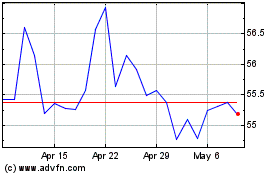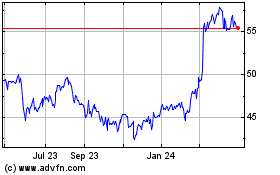By Jacob Bunge and Brent Kendall
Six current and former chicken-industry executives were indicted
on price-fixing charges, expanding the U.S. government's antitrust
prosecutions in the $65 billion poultry industry.
The charges, announced Wednesday, target executives from several
different chicken companies, including Pilgrim's Pride Corp., and
provide new details about the alleged conspiracy. Prosecutors said
the price-fixing took place from 2012 into early 2019, a longer
period than the Justice Department previously had alleged.
Among the individuals charged is Bill Lovette, the former chief
executive of Pilgrim's Pride, who retired in March 2019. Mr.
Lovette declined to comment. Representatives for Pilgrim's, the
second-largest U.S. chicken supplier by sales, didn't respond to
requests for comment.
"Executives who choose collusion over competition will be held
to account for schemes that cheat consumers and corrupt our
competitive markets," said Makan Delrahim, the Justice Department's
top antitrust official, in announcing the new charges. The
department said its investigation continues.
The new charges deepen the department's efforts to address
alleged price-fixing and bid-rigging in an industry that supplies
billions of pounds of chicken nuggets, breast filets and wings to
U.S. restaurant chains and grocery stores annually. Prosecutors in
June announced indictments of four senior industry executives on
similar charges, including the then-chief executive of Pilgrim's,
Jayson Penn. Mr. Penn, who exited the company last month, and the
other charged officials have pleaded not guilty.
Justice attorneys previously alleged that executives of
Pilgrim's and Claxton Poultry Farms, a smaller chicken company,
exchanged prices and other details during the process of bidding on
chicken-supply deals for major restaurant chains. Supermarket and
restaurant chains potentially harmed by the alleged price fixing
included Walmart Inc., Kroger Co., Popeyes Louisiana Kitchen and
Golden Corral, according to court documents filed in July.
Justice Department attorneys in 2019 subpoenaed chicken
companies, seeking information on their activities. After receiving
one, officials at Tyson Foods Inc. found some of its employees were
involved in the efforts alleged by the Justice Department, the
company has said. Tyson, the biggest U.S. chicken company by sales,
disclosed the findings to the government under a federal corporate
leniency program, and is cooperating with the investigation.
The new charges expand the number of companies and chicken
industry employees linked to the alleged activity. Other executives
and employees charged are Timothy Mulrenin, a Perdue Farms Inc.
sales executive who previously worked at Tyson; William Kantola, a
sales executive at Koch Foods Inc.; Jimmie Little, a former
Pilgrim's sales director; Gary Brian Roberts, an employee at Case
Farms who previously worked at Tyson, and Rickie Blake, a former
director and manager at George's Inc.
The defendants could face jail time and considerable fines if
convicted.
Mr. Mulrenin and Mr. Little declined to comment. Messrs.
Kantola, Roberts and Blake didn't respond to requests for
comment.
Representatives for Perdue and George's declined to comment.
Case Farms and Koch Foods didn't respond to requests for
comment.
A Tyson spokesman said the new indictments didn't change the
company's status in its leniency arrangement with the Justice
Department.
The companies are not identified by name in the indictment, but
people familiar with the probe confirmed their identities.
The Justice Department's charges describe friendly relationships
between executives and employees of rival chicken companies, who
allegedly called, emailed and texted one another during competitive
bidding processes.
After a food distributor in May 2016 sought longer terms for
credit lines with chicken suppliers, a Koch employee emailed Mr.
Lovette at Pilgrim's to ask if he had heard about it, according to
the indictment.
"Yes, we told them NO!" Mr. Lovette emailed back.
"OK. Then I am 100 percent on board," the Koch employee wrote
back, the Justice Department said. "If that changes can you please
tell me?"
"Will do," Mr. Lovette responded.
In May 2013, according to the Justice Department's indictment, a
restaurant chain contacted Mr. Little, then at Pilgrim's, as well
as a Tyson employee, asking about prices for frozen chicken. The
Tyson employee later that day called Mr. Little as well as Koch's
Mr. Kantola, speaking to each for a few minutes, according to the
indictment. Afterward, the Justice Department said, Mr. Little told
the restaurant chain that Pilgrim's would require an additional fee
for freezing the meat.
The Tyson employee, who wasn't named in the indictment, told Mr.
Mulrenin and Mr. Roberts, both then at Tyson, the prices Pilgrim's
and Koch planned to charge, the Justice Department said. Tyson
later submitted prices to the restaurant chain that included an
additional 3 cents a pound on top of regular chicken pricing at the
time, according to the indictment.
The indictment suggested yet more industry officials were
involved in the pricing discussions. In 2014, for example, an
unnamed Perdue employee allegedly spoke with a rival company, then
discussed with a colleague information he had gathered on the
pricing plans of two competitors. "Great info," the colleague
responded, according to the indictment.
Antitrust pressure has been growing on the U.S. meat industry,
in which a small number of big companies supply the bulk of the
beef, chicken and pork eaten by U.S. consumers. Major supermarket
chains, including Walmart, Kroger and Albertsons Cos. in recent
years have sued chicken suppliers including Pilgrim's, Tyson and
Sanderson Farms Inc., alleging the companies coordinated production
and price reporting to push up poultry prices.
Chicken companies are contesting those charges, arguing that
chicken prices remain driven by grain prices, export sales and
other market forces.
The Justice Department and the U.S. Agriculture Department are
separately probing major beef packers' cattle-buying activities,
after cattle ranchers saw livestock prices plunge twice over the
past year, following a major processing plant fire in 2019 and
widespread plant closures last spring due to Covid-19 infections
among workers.
Write to Jacob Bunge at jacob.bunge@wsj.com and Brent Kendall at
brent.kendall@wsj.com
(END) Dow Jones Newswires
October 07, 2020 19:04 ET (23:04 GMT)
Copyright (c) 2020 Dow Jones & Company, Inc.
Kroger (NYSE:KR)
Historical Stock Chart
From Mar 2024 to Apr 2024

Kroger (NYSE:KR)
Historical Stock Chart
From Apr 2023 to Apr 2024
